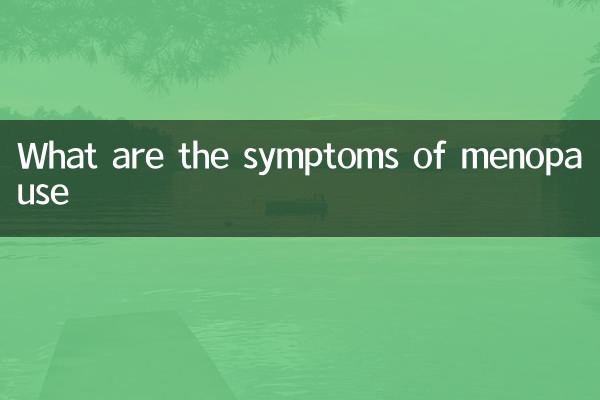What are the symptoms of menopause
Menopause is an important stage in a woman's menstrual cycle, usually occurring between the ages of 45 and 55, and marking the end of fertility. Due to the decrease in estrogen levels during this stage, women will undergo a series of physical and psychological changes. Understanding the symptoms of menopause can help you better cope with the challenges of this period. The following is a summary of menopausal symptoms that have been hot topics on the Internet in the past 10 days.
1. Main symptoms of menopause

Symptoms of menopause can be divided into two categories: physical and psychological. Here are some common symptoms:
| Symptom type | Specific performance |
|---|---|
| Physiological symptoms | Hot flashes, sweating, insomnia, palpitations, joint pain, dry skin, decreased libido |
| psychological symptoms | Mood swings, anxiety, depression, memory loss, difficulty concentrating |
2. Detailed analysis of menopausal symptoms
1. Hot flashes and sweating
Hot flashes are one of the most typical symptoms of menopause, characterized by a sudden feeling of warmth in the face and upper body, accompanied by profuse sweating. This phenomenon usually lasts from seconds to minutes and may occur multiple times throughout the day.
2. Insomnia
Due to changes in hormone levels, many women experience sleep disorders during menopause, characterized by difficulty falling asleep, waking up easily, or waking up early. Insomnia not only affects quality of life, but may also aggravate other symptoms.
3. Mood swings
Menopausal women often experience emotional instability and are prone to irritability, anxiety and even depression. These psychological changes are closely related to fluctuations in hormone levels and may also be affected by life stress.
4. Joint pain
Estrogen has a protective effect on bone health, and as estrogen levels decline, some women experience joint stiffness and pain, which may be an early sign of osteoporosis.
3. Duration of menopausal symptoms
| symptom | average duration |
|---|---|
| hot flashes | 1-5 years |
| mood swings | 6 months-2 years |
| Insomnia | Several months to several years |
4. How to relieve menopausal symptoms
When faced with menopausal symptoms, you can take the following steps to improve your quality of life:
| Mitigation methods | specific suggestions |
|---|---|
| healthy eating | Increase calcium and vitamin D intake and reduce caffeine and alcohol |
| regular exercise | At least 150 minutes of moderate-intensity exercise per week |
| psychological adjustment | Practice meditation, take deep breaths, and seek psychological counseling |
| medical intervention | Consider hormone replacement therapy under the guidance of a doctor |
5. Misunderstandings related to menopause
There are some common misconceptions about menopause that need clarification:
1. Menopause is not a disease, but a natural physiological process.
2. Not all women experience severe menopausal symptoms.
3. Menopause does not end suddenly but is a gradual process.
4. Men also have menopause, but the symptoms and manifestations are different.
6. When Do You Need Medical Treatment?
Although menopause is normal, you should seek medical attention promptly if:
| Condition | suggestion |
|---|---|
| Severe depression or suicidal tendencies | Seek professional help now |
| abnormal vaginal bleeding | Other gynecological diseases need to be ruled out |
| Symptoms seriously affect life | Consider medical intervention options |
Menopause is an important turning point in a woman's life. Understanding its symptoms and coping methods can help women get through this stage better and maintain physical and mental health. If the symptoms are severe or last for a long time, it is recommended to seek medical treatment in time and seek professional guidance.

check the details

check the details